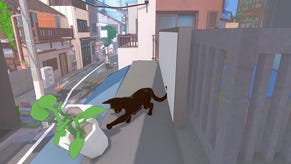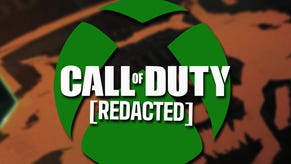The OlliOlli story: "Sony told us we weren't asking them for enough money"
John Robertson discovers how Super Meat Boy and Hotline Miami influenced a new spin on the neglected skateboarding genre.
"We do have some references to Tony Hawk's and Skate in there, but the bigger influences have been the likes of Hotline Miami and Super Meat Boy"
"OlliOlli breathes new life into a neglected genre," wrote VG247's Matt Martin on the indie skateboarding game currently sending dual-shockwaves of accomplishment and frustration throughout the PS Vita-owning community.
He's right. Not only has developer Roll7 demonstrated that new takes on old genres do work, but it has highlighted just how much room for expression and creativity there is to be mined from the simple of idea of plonking a dude on a bit of wood with wheels. The likes of Skate and Tony Hawk's may have died out, resulting in the neglect of a genre, but looking at those franchises it seems that the skateboarding idea was dilapidated. Creativity was lacking, which is the very reason for their trip to purgatory.
It has a taken a tiny indie team of first-time console developers to highlight that fact. Given the negative connotations surrounding skating games, thanks in large part to the failings of the aforementioned duo, it seemed like an awfully big risk for such a small team to concentrate its efforts on a game like OlliOlli. A skating game. A Vita-exclusive skating game.
We sat down with Roll7 director Tom Hegarty to discuss the origins of the game, the process of indie development with Sony and the reasons behind Vita exclusivity.
"The three of us that founded the company have all been into skateboarding at various stages in our life," Hegarty reflects when probed about OlliOlli's concept. "I'm probably the one least into it, mainly because I'm terrible at it, but our creative director John Ribbins is an excellent skater - when he was about 13 he was actually sponsored by a skate brand.
"At that age he started thinking about how it would be cool to have a 2D, pixelated, side-scrolling skating game. That was about as far as the idea went at that point.
"About 15 years later, we [at Roll7] were making prototypes and one day John came in and showed us this skating game he was working on. He got it running on all of our phones and it really was so addictive, even in a bare bones state."
That bare bones state took the form of a endlessly-running skating game that utilised touch-screen controls, flicking the left of the screen to do a trick and tapping the right to land - basic principles, minus the touch screen, that remain core to OlliOlli today. It was a skeleton design that worked.
"Although it sounds big-headed to say it about your own game, it was the game that I would always play on my phone," explains Marsden. "It was also the game the rest of the team played, so we thought we should do something with it.
"When we started touting it about we bumped into James Marsden [director of Velocity Ultra dev FuturLab] and showed the game to him during a completely random meeting. I think he was wearing skater shoes and a skater hat when I saw him, so looked approachable for this kind of game."
It was that meeting with Marsden, and his connection with Sony following the success of Velocity Ultra on Vita, that opened Roll7's first door to Vita development. With an email heading that read, in Hegarty's words "something like, 'Sony vs. Roll7: Fight!'" the OlliOlli team were introduced to Shahid Ahmad, Sony Computer Entertainment Europe's head of strategic content management and the person most readily associated with the Vita's dedication to indie development.
At this point, with only a basic demo, a decision on which platform to develop for hadn't even been made.
"The decision came [to go with Vita] from both sides, really," Hegarty explains. "Sony at the time were looking for Vita content and because we had a mobile demo it felt like a natural way to go."
What was certain much earlier was that, for OlliOlli to work, Roll7 had to move away from the mobile space they had explored with 2012's iOS game Gets to the Exit.
"You get a complete range of gamers playing games on mobile phones, but they tend to be more 'casual' - and I certainly don't mean that in a derogatory sense," Hegarty continues.
"We definitely made the right decision by going with the Vita. The game is really all about the idea of 'flow', and that flow is built by the combo system and the different tricks available to you. Those tricks and combos only became possible with the Vita's analogue stick, and the triggers allowed us to add spins which massively expanded the range of tricks.
"Obviously, you're not physically on a real board, but we feel that the analogue stick does provide some sort of similarity to real skateboarding."
While the Vita's design and input options have facilitated and expanded the core mechanics in a way that a smartphone could never hope to match, the process of getting the game onto the device in the first place was not one anyone at Roll7 knew much about.
Hegarty is quick to point out his own ignorance in this area, as well as applaud Sony's role in providing a helping hand: "This really was a step in the dark for us, our first console title. Sony were really good to us during the pitching progress and, having run my own businesses for something like 10 years now, I've always been wary of pitching to clients.
"If we had thought about how Skate and Tony Hawk's are faring now we might have thought differently about making a skateboarding game, so I'm glad we remained ignorant"
"After our first pitch to Sony they told us that we weren't asking them for enough money... they said they liked what we pitched, but it wasn't going to work with the amount of money we asked for. That's not usually how it works, you usually get asked to do even more than you've pitched and then get hammered down on the price [laughs]."
Not only did Sony like the OlliOlli concept, but they had no interest in taking ownership of the game away from Roll7 - an approach that Hegarty believes has a lot to do with why indie studios are so willing to work with the platform holder.
"We always wanted to retain the rights to the game, but we didn't have to argue that point with Sony. I think that's how they've lured so many smaller studios to their platforms, and I think part of the idea behind what [Shahid Ahmad] has been running is to help developers like us to make that step to console development, because it is daunting and there are so many unknowns."
One of the those unknowns was how to time the launch itself, the final confirmation of which coming about as much through personal failure as forward planning.
"Originally we were due to release on 20 November 2012, but we failed the QA process. We did not anticipate how tough that QA process would be at all and it eventually took us four attempts to pass," Hegarty admits.
"The game was actually approved in mid-December and Sony said that they had a slot open just before Christmas... we decided, though, to not go through the launch then because January looked quieter on the release front.
"I think the delay, through our own fault at the QA stage, has actually worked out well - not least because the original 20 November date we had was the same day that the Tearaway coverage embargo was lifted. We would have gotten no coverage.
"I would definitely recommend that other small studios release their game in January, that seems to get you a lot more publicity."
With average review scores that single out OlliOlli as one of the year's best games so far, generating positive publicity - rather than merely publicity - has not been a problem. Guilty by skateboarding-
game association has most certainly not been a problem for this title. Hegarty, however, explains that the skateboarding game climate didn't even figure in the game's design: "I think because we came at this game from a background of building different prototypes, and this is the one that worked, the general idea and status of skateboarding games didn't really come into our thinking.
"Also, because Sony were interested in our idea that gave us the confidence to think 'well, we must have something going for us here.'"
In fact, Hegarty sees OlliOlli as more similar to a number of other, non-skateboarding, games. "OlliOlli is skating inspired, and we do have some references to Tony Hawk's and Skate in there, but the bigger influences have been the likes of Hotline Miami and Super Meat Boy, games that have that - and I know they're overused phrases - 'hard as nails' and 'just one more go' appeal.
"I imagine if we had thought about how Skate and Tony Hawk's are faring now we might have thought differently about making a skateboarding game, so I'm glad we remained ignorant to that."
Having now gone through the entire pitch, design and launch process with OlliOlli on Vita, Hegarty believes that the core team at Roll7 is better placed to create their next game - a title that he "can't talk really about now... but our next project is going to be for PlayStation."
Although, that might not be a PS4 game. If you thought the life of a PlayStation-family game developer is all about building, and having access to, the newest games, think again...
"We only managed to get our hands on a PS4 a couple of weeks ago," Hegarty laughs. "Stupidly, we didn't pre-order it."





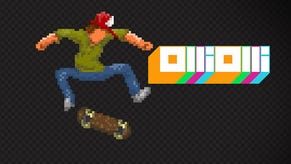
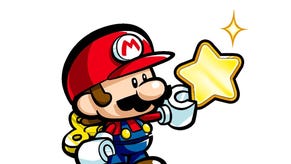
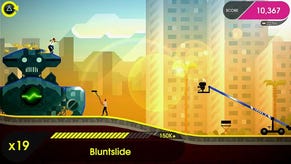
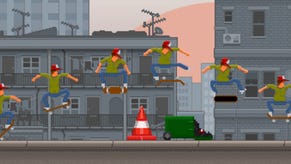
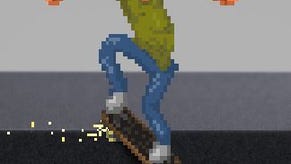
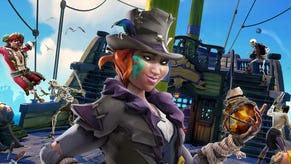
.jpg?width=291&height=164&fit=crop&quality=80&format=jpg&auto=webp)
.png?width=291&height=164&fit=crop&quality=80&format=jpg&auto=webp)


